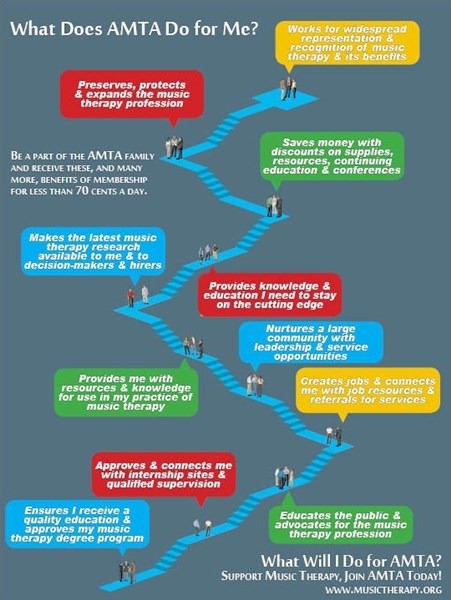-by Annette Whitehead-Pleaux, MA, MT-BC
AMTA as a community
As with most allied health professions, music therapy has a professional organization, the American Music Therapy Association (AMTA). The purpose of AMTA “is to advance public awareness of the benefits of music therapy and increase access to quality music therapy services in a rapidly changing world” (AMTA, 2017). This advocacy of AMTA includes educating government officials (including national senators and representatives, governors, and state legislators), organizations (including Veteran’s Affairs Administration, National Institute of Health, and Remo Drums), and the general public.
I have been a member of AMTA since I was a music therapy student, maintaining my membership throughout my career because of the many benefits it has given me. The organization not only works on a therapist’s behalf to increase our visibility, it also increases client access to our services.
Here are some of the other great things about AMTA membership:
- Two high quality journals created to keep therapists informed of the latest research and clinical practices within music therapy
- A forum for music therapists to come together and share knowledge, experience, questions, and music
 A way for music therapists to share their voices and ideas, as well as an opportunity to shape the field of music therapy as it grows and develops
A way for music therapists to share their voices and ideas, as well as an opportunity to shape the field of music therapy as it grows and develops- Volunteer members and staff who are working to protect the field of music therapy through countless hours of dedicated service
- National and regional groups that create and support the growth of music therapy in underdeveloped and new areas
- Resources, documents, and knowledge that deepen my practices as a music therapist, a music therapist supervisor, and a music therapy educator
- Opportunities to develop skills outside of clinical music therapy, by taking on leadership roles, conducting research and writing scholarly materials
AMTA as an advocate
For our stakeholders, those who receive our services and those who hire us to provide music therapy services, AMTA works on your behalf as well. AMTA has been involved in developing and modifying legislation and regulations to make music therapy more readily available to those who need our services. AMTA works to educate the public about music therapy. Finally, AMTA serves to connect those interested in music therapy services with music therapists in their area.
If you are a music therapist or music therapy student, you can learn more about joining AMTA here!
